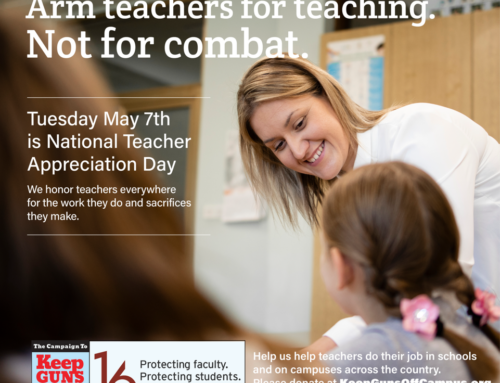Depressed dads in families coping with job loss were more likely than other parents to buy a gun in the early weeks of the pandemic, study finds
FOR IMMEDIATE RELEASE
(Croton Falls, NY – April 30, 2020) — As families across the country struggle with the financial and emotional fallout of Covid-19, fathers in households coping with job loss who reported feeling “a lot more down or depressed” than usual were more likely to have recently bought a gun than other parents, a new study shows.
Overall, more than 1 in 5 caregivers of children 18 or younger said they purchased a firearm between early March and early April, with about half of all parents ages 25 to 44 now reporting gun ownership. Among parents feeling more depressed since the onset of the pandemic, nearly 60% are gun owners with 39% having bought guns within the last month, the study found.
The IPREX Parent Normal survey, fielded between April 1 and 8 by the research and creative firm Marketing for Change Co. for the IPREX global communication network, asked 1,519 U.S. parents and other caregivers about their behaviors, their children’s behavior and their perception of what other parents do. The findings produced what is perhaps the first statistical snapshot of American parenting in the pandemic.
The spike in gun purchases at a time when family tensions are running high as parents juggle disrupted routines, home schooling, and lost income is cause for major concern, said Andy Pelosi, Executive Director of The Campaign To Keep Guns Off Campus.
Pelosi noted that as schools closed because of the pandemic, March 2020 became the first March in 18 years without a shooting at a public K-12 school. He said efforts to prevent gun injuries and deaths must now re-focus on the family home, where firearms are more abundant than ever.
Americans purchased about 2 million firearms in the early weeks of the Covid-19 outbreak, according to a New York Times analysis of federal data. The Federal Bureau of Investigation also processed more than 3.7 million firearm background checks in March — an all-time high.
“The family home across America has become the new school campus. The arming of parents and caregivers at a time of enormous family stress is a major public health concern,” Pelosi said. “This is a clarion call for all families with firearms in the home to take steps to keep children and others safe. We recommend gun owners lock up the weapon unloaded, store ammunition in a separately locked container, and talk to their children about gun safety.”
In 2017, the most recent year for which complete data is available, 39,773 people died from gun-related injuries in the U.S., according to the Centers for Disease Control and Prevention. With respect to young people, every day, 8 children and teens are shot by “family fire” — a shooting involving an improperly stored or misused gun found in the home. In addition, studies have shown the following:
- 6 million children live in homes with access to an unlocked or unsupervised gun.
- 75 percent of kids know where that gun is stored in their home, according to Brady.
One bright spot in the IPREX Parent Normal survey’s findings on guns was that more than 4 in 5 caregivers (83%) who recently purchased a firearm reported talking to their children about gun safety. The study also found that one in five (20%) have talked to their child about what to do in a school shooting.
“In most school shootings, the weapons involved were taken from the home,” Pelosi said. “With kids at home 24/7, parents and caregivers must take thorough steps to safely store firearms unloaded, with the ammunition stored in a separate locked container. Moreover, it is crucial that parents and caregivers are actively engaging children in conversations about firearm safety.”
Safely storing weapons and ammunition also plays a role in reducing risk for domestic violence and gun suicide. When an abusive partner has access to firearms, a victim of domestic violence is five times more likely to be killed, according to Giffords Law Center. Every year, 600 American women are shot to death by intimate partners.
When it comes to suicide, nearly 60% of all guns deaths are suicide-related, according to the U.S. Centers for Disease Control and Prevention.
“When guns are combined with the additional risks and stresses being faced in light of Covid-19, the chances of more incidents will only be magnified,” Pelosi said.
Key findings on gun behaviors from the Iprex Parent Normal survey:
- More than 1 in 5 caregivers (22.1%) of children 18 or younger said they recently purchased a firearm (between early March and early April)
- Caregivers who made a recent firearm purchase ((between early March and early April) were most likely to be fathers (28.9%), followed by mothers (17.9%). Another 7.7% were grandparents.
- Of caregivers who said they were feeling “feeling down or depressed a lot more” than before the pandemic, 60% are gun owners with 39% having bought guns between early March and early April
- More than one-third — 34% — of parents who said an adult in their household had recently lost a job also reported recently purchasing a firearm in early March and early April, and more than half (56.8%) reported owning a gun
- More than two-thirds (73.8.3%) of recent gun purchasers were 25- to 44-years-old
- Gun ownership was most prevalent among parents ages 25 to 44, with 51.4% of those 24 to 34 and 47.5% of those 35 to 44 reporting having ever purchased a gun.
- Gun ownership was also more likely in higher income households, with more than half (51.7%) of households earning $75,000 to $199,000 reporting having ever purchased a gun
# # #
Contact: Andy Pelosi, Executive Director, The Campaign to Keep Guns Off Campus,
email: [email protected] Tel. 914-629-6726
About The Campaign to Keep Guns Off Campus. The Campaign to Keep Guns Off Campus works with colleges and universities across the country to oppose legislative policies that would force loaded, concealed guns on campuses. Since 2008, The Campaign to Keep Guns off Campus has helped stop campus carry legislation in 18 states and is the only national organization of its kind tasked to protect higher educational institutions and the communities they serve. Follow us on Facebook, Twitter and Instagram.
About Marketing for Change Co. Marketing for Change (MarketingforChange.com) is a creative and research firm anchored in social psychology and behavioral economics. The agency conducted this research on behalf of the IPREX global communications network (www.iprex.com).
Where to find information about gun locks and safe gun storage
Here are some resources that can be reviewed:
https://projectchildsafe.org/safety/safe-storage
https://www.bradyunited.org/program/end-family-fire
https://lawcenter.giffords.org/gun-laws/policy-areas/child-consumer-safety/safe-storage/#key-elements




